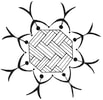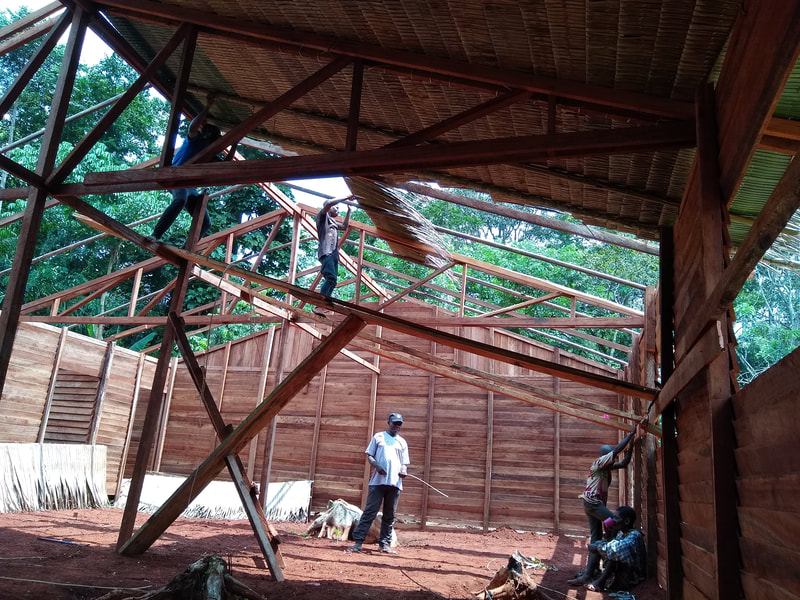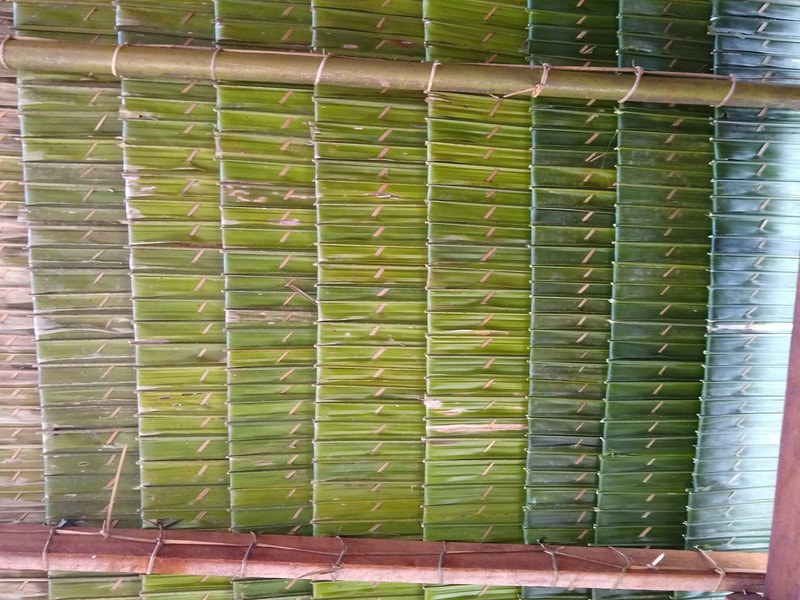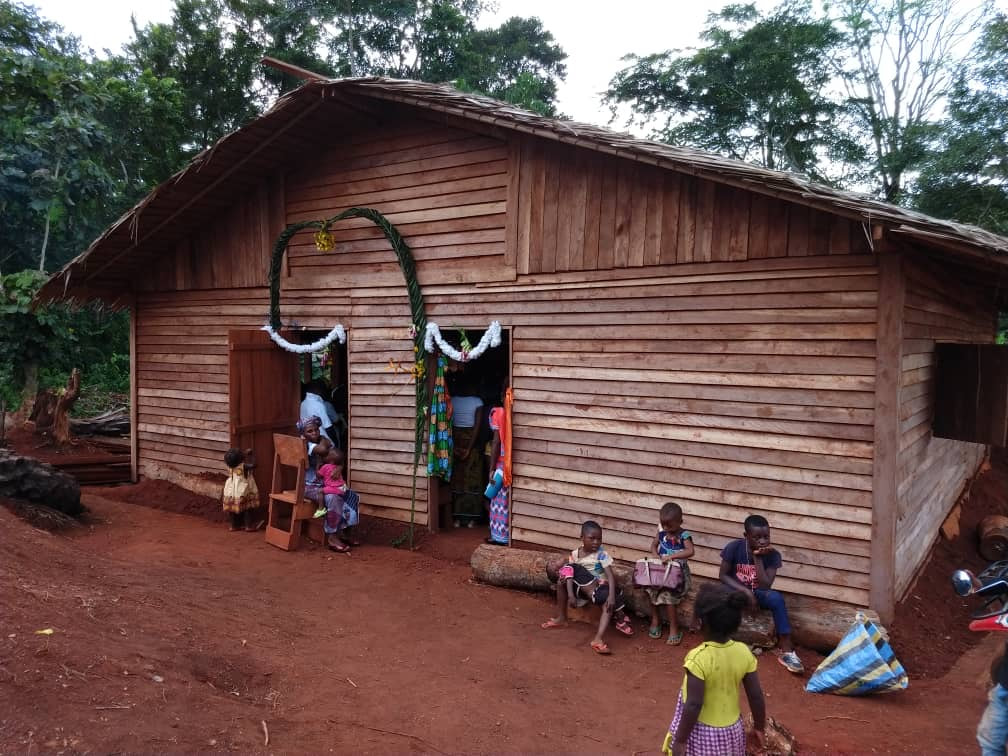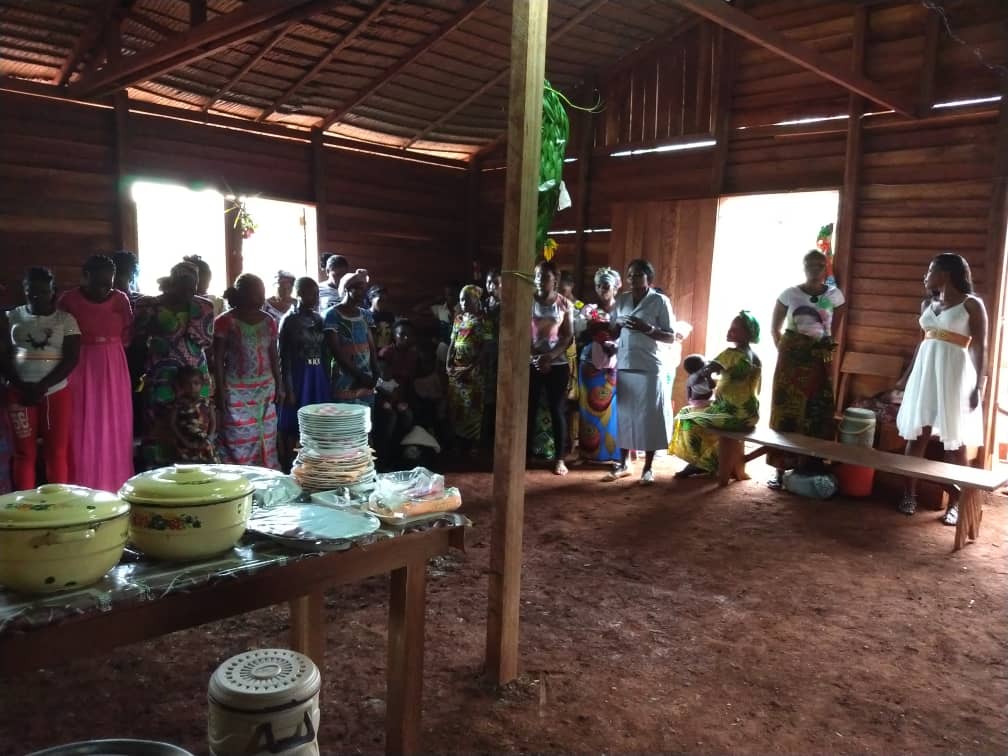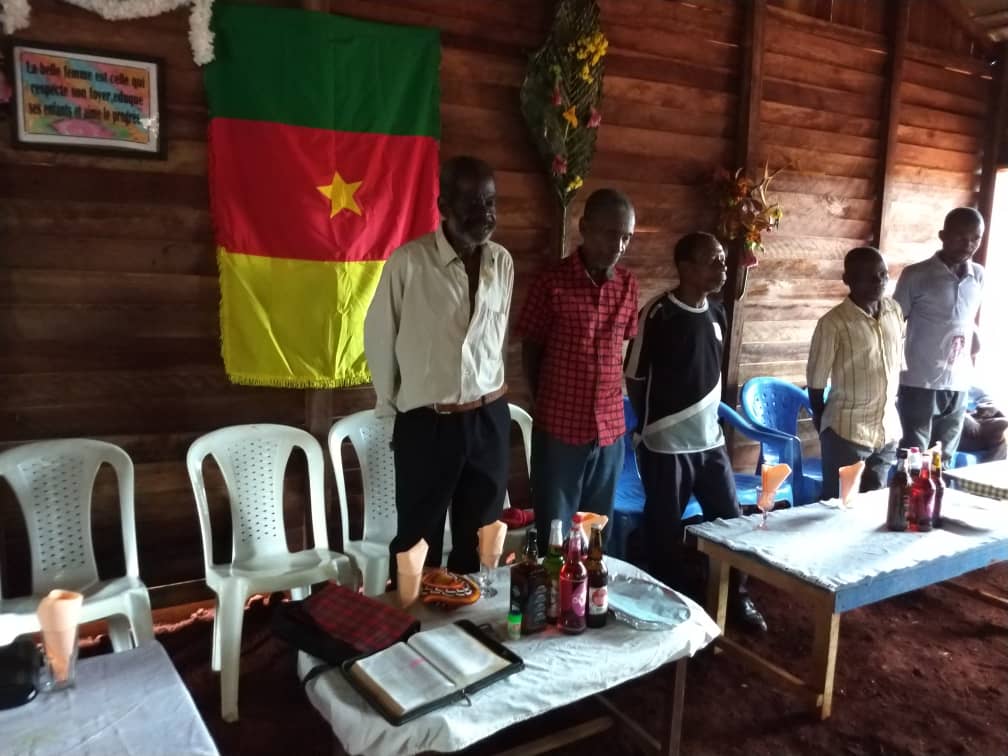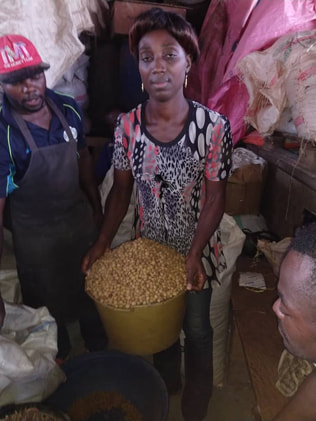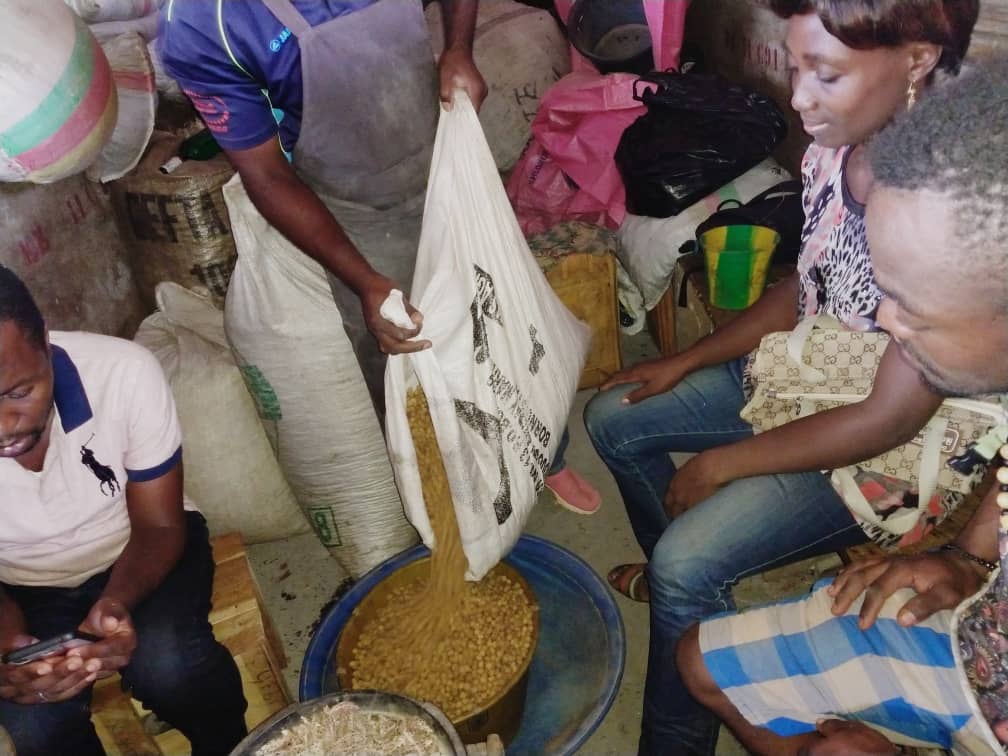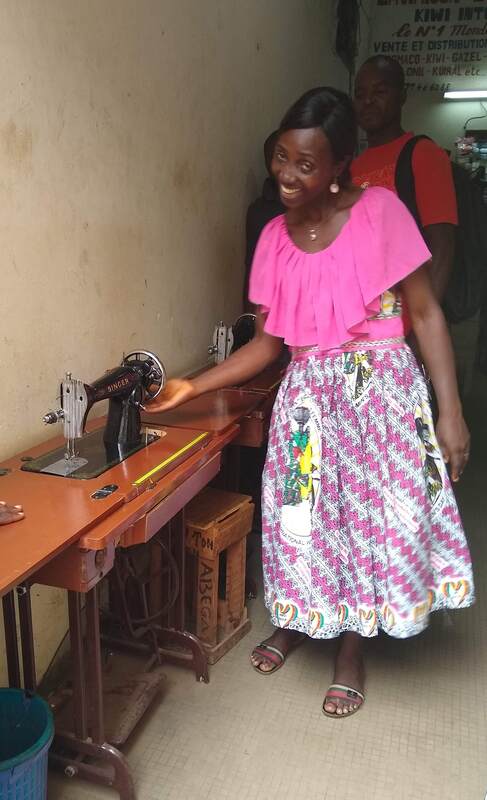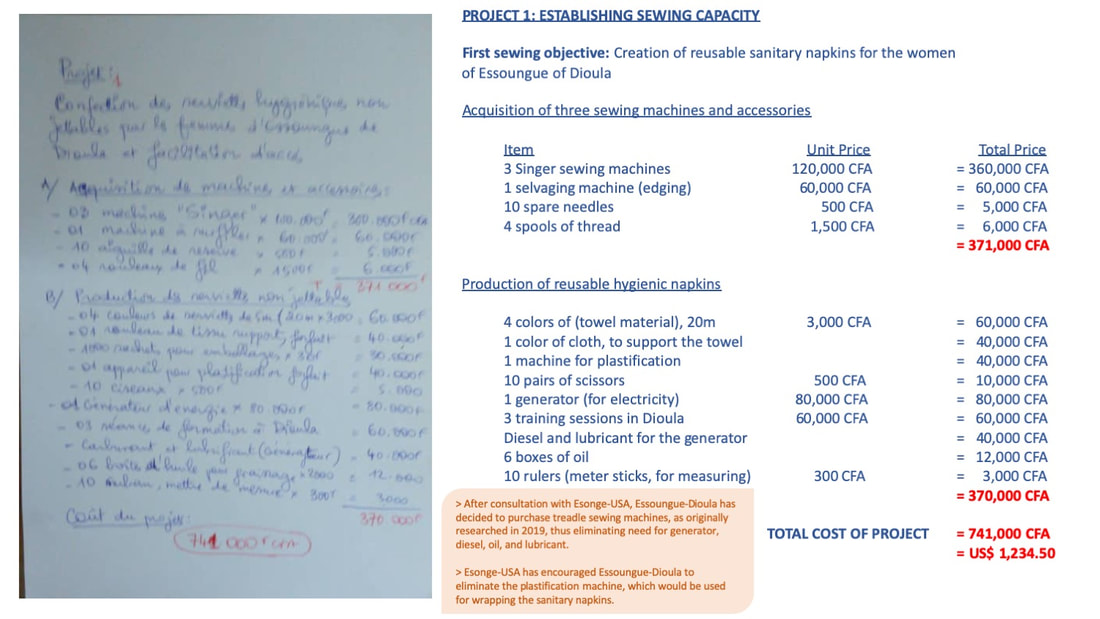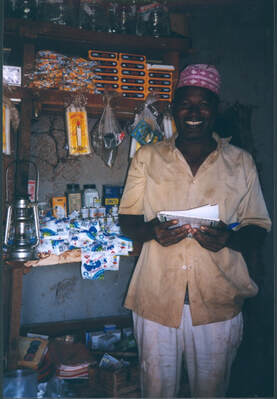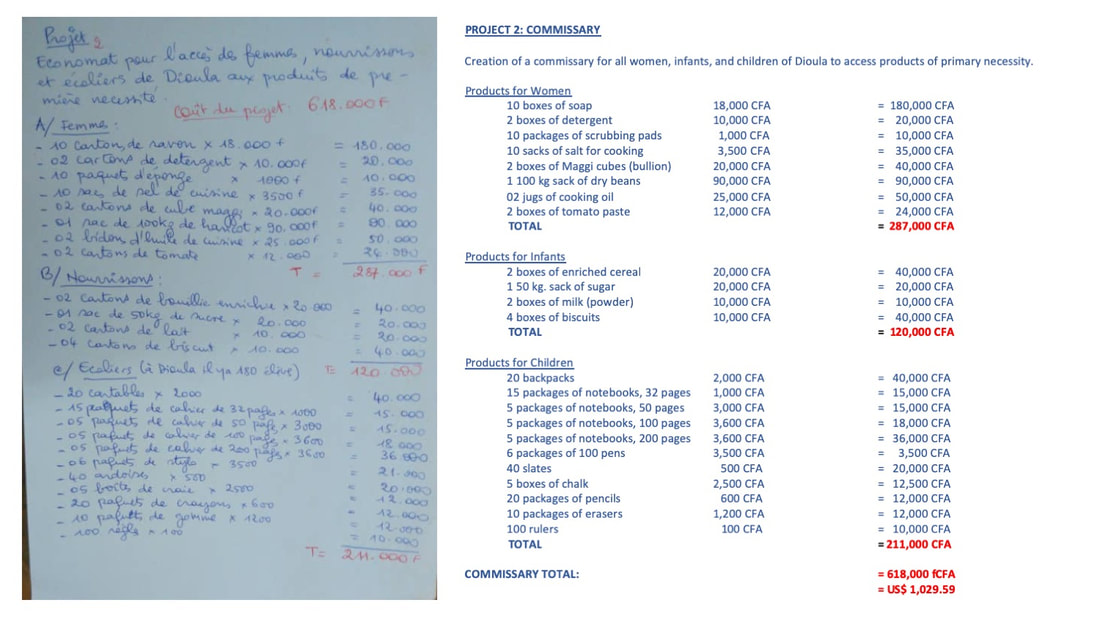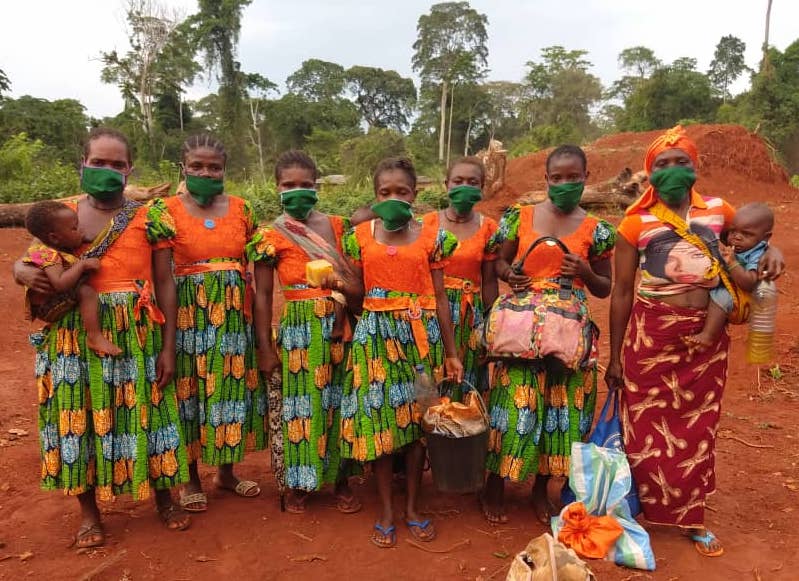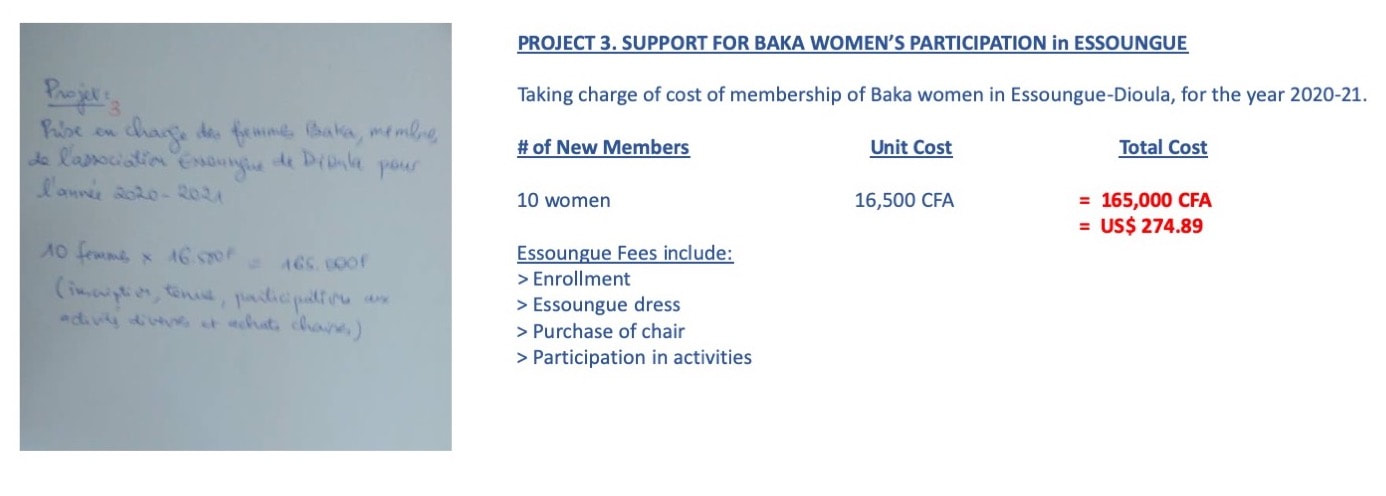Village-based Projects
The kinds of village-based projects that the women of Essoungue have envisioned, and which Esonge-USA is eager to support, include initiatives that aim simultaneously to improve women's socioeconomic realities and conditions of subsistence:
The kinds of village-based projects that the women of Essoungue have envisioned, and which Esonge-USA is eager to support, include initiatives that aim simultaneously to improve women's socioeconomic realities and conditions of subsistence:
- collaborative harvest of non-timber forest products such as wild mango, kumbi (a particular species of forest leaves), gobo (a forest nut), and peki (wild mango seeds), all of which command high prices in urban markets in Cameroon;
- purchase of three treadle sewing machines, to enable women to sew reusable sanitary napkins (which are extremely hard to find and expensive), as well as school uniforms for their children so that they no longer have to buy them);
- establishment of a commissary, a shop that sells basic necessities for women, infants, and school-age children, at wholesale prices;
- construction of bee hives to attract native forest bees;
- small-scale cultivation of palm oil trees, intercropped in women’s forest gardens;
- raising chickens, including the building of chicken coops and selection of appropriate species, to provide eggs, meat, and a source of income;
- increased cultivation of soy beans, peanuts, and other protein-rich, nitrogen-fixing crops;
- collective transport of families’ cocoa harvest to urban markets, where cocoa growers can benefit from higher prices per kilogram of cocoa by eliminating intermediary buyers.
Completed and Ongoing Projects
One of the most exciting dynamics of working with the women of Essoungue-Dioula is that they are far ahead of Esonge-USA in terms of organization, project planning, and implementation. Rather than the Euroamerican-based NGO proposing projects that we imagine would be appropriate in the villages of southeastern Cameroon, it is the women themselves who have seized the initiative to form their association, to establish their physical meeting space, to propose projects, to implement projects, and to submit reports on their outcomes and budgets. Esonge-USA has responded -- one step behind Essoungue-Dioula but keeping up with these determined women -- offering feedback and advice on projects, providing seed funding for their initiatives, and giving administrative support.
One of the most exciting dynamics of working with the women of Essoungue-Dioula is that they are far ahead of Esonge-USA in terms of organization, project planning, and implementation. Rather than the Euroamerican-based NGO proposing projects that we imagine would be appropriate in the villages of southeastern Cameroon, it is the women themselves who have seized the initiative to form their association, to establish their physical meeting space, to propose projects, to implement projects, and to submit reports on their outcomes and budgets. Esonge-USA has responded -- one step behind Essoungue-Dioula but keeping up with these determined women -- offering feedback and advice on projects, providing seed funding for their initiatives, and giving administrative support.
Establishment of the Essoungue-Dioula Bank Account
In 2019, Pascaline and the Treasurer of Essoungue-Dioula, Adjimi Mokompea Danielle traveled to Yaoundé and Bertoua to establish their association's bank account, to conduct market research for the future sale of forest products such as gobo nuts and peki, wild mango seeds, to purchase office supplies for record-keeping and administrative work, and to buy school supplies for the village children.
The establishment of Essoungue-Dioula's bank account was crucial for ensuring that financial support from Esonge-USA could be legally and securely transmitted to support the women's important work. After meeting with banking officials from several banks (together with Stephanie and Philippe), Pascaline and Danielle decided that the services and terms offered by Afriland Bank, a South African bank serving African communities, would be best. After several days of dealing with administrative procedures, the account was open and Essoungue-Dioula could begin depositing, and receiving, funds. At the conclusion of their administrative work in Yaoundé and Bertoua, Pascaline, Danielle, and Philippe traveled back to Dioula, covering the 900 kilometers in three days.
The establishment of Essoungue-Dioula's bank account was crucial for ensuring that financial support from Esonge-USA could be legally and securely transmitted to support the women's important work. After meeting with banking officials from several banks (together with Stephanie and Philippe), Pascaline and Danielle decided that the services and terms offered by Afriland Bank, a South African bank serving African communities, would be best. After several days of dealing with administrative procedures, the account was open and Essoungue-Dioula could begin depositing, and receiving, funds. At the conclusion of their administrative work in Yaoundé and Bertoua, Pascaline, Danielle, and Philippe traveled back to Dioula, covering the 900 kilometers in three days.
|
Price research at Mfoundi Market
|
Official photos: bank account application
|
Journey home to Dioula: 900 km.
|
Construction of the Essoungue Meeting House
At every stage, the women of Essoungue-Dioula have been one step ahead of Esonge-USA, seizing the initiative and engaging their dynamic association to move forward towards a more secure future for their families and village. For example, as Esonge-USA was still going through the long legal process of becoming a federally-recognized non-profit, we met in New York to begin brainstorming practical ways that we would, in the near future, be able to support the women of Essoungue-Dioiula. One of the first projects we had in mind was the construction of a small building, together with a large traditional verandah for holding meetings. When Stephanie traveled to Dioula for her summer field season in 2019, she found that not only had the women of Essoungue-Dioula had the same idea, they had already taken action! Following the incorporation process of their association, the Essoungue women had held village meetings to encourage other villagers to participate in the association, including inviting men to participate as members (though not as office-holders). This inclusivity swelled the membership of the association further, and gave the women the opportunity to articulate their goals -- and their needs -- to the village and village leaders.
Before long, one of the elder men in Dioula had offered a parcel of land, across the street from the school, to Essoungue as their home base; another man in Dioula, who oversees a particular kind of small-scale, local timber company in the council forest area, offered to provide the women with timber for construction of their building. Working with other villagers, the women designed their building; women and men together cleared the land, built the structure, wove raffia roofing shingles, and completed the building. By June of 2019, just six months after Essoungue-Dioula had been officially recognized as a legal association, the women -- together with support from the village -- had built their home base, or Gala Essoungue (Essoungue House).
|
Photos from top left, across and then down:
1. Placing woven raffia palm panels as shingles for the roof (June, 2019) 2. Overlapping raffia palm roof shingles, from inside Gala Essoungue (June, 2019) 3. Essoungue House - nearly complete! (August, 2019) 4. Decorated doors of Essoungue House, to celebrate the opening (October, 2019) 5. Women of Dioula, including Essoungue members, with the banquet they prepared for the celebration (October, 2019) 6. Elders of Dioula, gathered for the opening celebration of Essoungue House |
Essoungue-Dioula officially opened Gala Essoungue in October, 2019. Inviting all of the village and regional government officials, the women of Essoungue launched a new era in women's leadership in southeastern Cameroon, working together to build a more secure, stable, and healthy future for their families. Emphasizing that Essoungue works for the betterment of all women and families in the village, the women chose not to wear their membership dresses, which would have set them apart from others. Elders from all of the ethnic groups were in attendance, and were recognized by the women for their support of the association. Women provided a feast of dishes, including bananas tied to the central post of the Essoungue House, symbolizing that resources are available for all.
Collaborative harvest of gobo nuts
During the gobo harvest of 2020, the women of Essoungue-Dioula harvested 600 kg. of gobo nuts, a savory, oil- and nutrient-laden nut that Cameroonians relish as the base for stews. Essoungue harvested, processed, and prepared the gobo nuts for transportation to market in Yaoundé. The women also had to secure paperwork to transport the nuts, because the forest where they live abuts the Lobéké National Park, and harvesting any forest products, including non-timber and non-animal forest products such as nuts, now requires approval from the Ministry for Forests and Animals (MINFOF). Traveling to Yaoundé took over a week, but when they reached the market they were able to sell the gobo nuts at Mfoundi Market, where Pascaline and Danielle, Essoungue-Dioula's Treasurer had done market research in 2019. With the sale of the gobo nuts, the women raised $1,200.00, which they deposited in the Essoungue bank account.
|
Women of Essoungue-Dioula measuring and baling gobo nuts, to sell in Mfoundi Market, Yaoundé. One enamel pot of gobo nuts sells for approximately $25.00; one bucket sells for $125.00. (November,2019)
|
Projects Proposed by Essoungue-Dioula for 2020-21
Before the the world realized the globally devastating impact that COVID-19 would have on communities far and wide beginning in early 2020, the women of Essoungue-Dioula had identified, discussed, planned, and proposed three projects for the year 2020-21: purchase and training to use treadle sewing machines; establishment of a small wholesale commissary; sponsoring village women to join Essoungue, even if they couldn't afford the initial membership fee (approximately $20.00).
1. Treadle Sewing Machines: Developing Sewing Capacity
The women seek to purchase three foot-pedal operated sewing machines, which they would use for a variety of community sewing projects. The first priority project is the production of washable, reusable sanitary napkins for the women of Dioula and, if their plans succeed, for sale at low cost to women in other villages. Women have no access to sanitary products in the village, but rely on folded rags or bundles of leaves, as well as social isolation during menstruation, to cope with the monthly bleeding. Using a simple design and layers of absorbent cotton, the women aspire to produce sanitary napkins. Women of Essoungue would be able to access these sanitary napkins at cost -- and would benefit from learning skills of sewing by participating in the production of the napkins. If this project is successful, the women of Essoungue-Dioula aim to produce enough sanitary napkins to sell them, at a very modest price increase, to other women in the region. Any profits that they earn from the sale of sanitary napkins would be deposited into Essoungue's savings account, allowing the association to begin to grow a nest egg of capital for future projects.
The women seek to purchase three foot-pedal operated sewing machines, which they would use for a variety of community sewing projects. The first priority project is the production of washable, reusable sanitary napkins for the women of Dioula and, if their plans succeed, for sale at low cost to women in other villages. Women have no access to sanitary products in the village, but rely on folded rags or bundles of leaves, as well as social isolation during menstruation, to cope with the monthly bleeding. Using a simple design and layers of absorbent cotton, the women aspire to produce sanitary napkins. Women of Essoungue would be able to access these sanitary napkins at cost -- and would benefit from learning skills of sewing by participating in the production of the napkins. If this project is successful, the women of Essoungue-Dioula aim to produce enough sanitary napkins to sell them, at a very modest price increase, to other women in the region. Any profits that they earn from the sale of sanitary napkins would be deposited into Essoungue's savings account, allowing the association to begin to grow a nest egg of capital for future projects.
The women of Essoungue-Dioula would like to embark on a second, more complex sewing project once they have become competent in using the treadle sewing machines: sewing school uniforms for their children. School children in Cameroon must wear uniforms to public schools; these uniforms are expensive to buy from merchants. The women of Dioula aim to learn to sew well enough that they could produce school uniforms themselves, bringing savings to their members and, perhaps in the future, providing another revenue stream for the association.
|
Pascaline researching sewing machines in Yaoundé.
(July, 2019) |
When Pascaline, Essoungue-Dioula's President, and Danielle, Essoungue-Dioula's Treasurer, traveled with Stephanie to the capital of Cameroon, Yaoundé, to establish Essoungue-Dioula's bank account, we also conducted market research on sewing machines. After visiting numerous stores selling treadle sewing machines, Pascaline and Dani were able to negotiate a price for three Singer sewing machines, at 120,000 CFA each (approximately $300 each). Pending funding approval from Esonge-USA, the original plan was for Stephanie to purchase the sewing machines on behalf of Essoungue-Dioula in May, 2020, and to transport the sewing machines back to Dioula when she traveled down to the southeast for her summer field work. However, with the global interruptions caused by COVID-19, this project is on hold for the time being. We do recognize that if the sewing machines were already in place in Dioula, the women could be hand-sewing hygienic masks, rather than placing an order for hand-sewn masks with a tailor in Moloundou. The women will be well prepared to sew the personal protective equipment that they need in the future.
|
|
2. Commissary
The second project that Essoungue-Dioula has proposed is to establish an "Economat," or a commissary, in Dioula. Because the region of southeastern Cameroon is very remote -- approximately 900 kilometers from Yaoundé, the capital of Cameroon -- and because the state of roads is often very poor, prices for basic goods are very high. Merchants from other regions of Cameroon have come to Dioula and other villages, to set up profit-seeking shops selling commodities. These merchants sell their wares -- cooking oil, rice, salt, sugar; soap and kerosene; used clothing and flip flops; tobacco and candy -- at a steep markup, from small shop that they build in the village. While it is necessary to have such small shops for people to purchase goods that they cannot hunt, fish, gather, or grow, the merchants are all outsiders; it is exceedingly difficult for people living in the forest to gather enough capital to begin shops of their own. |
|
The women of Essoungue-Dioula seek to establish a commissary, so that they can provide an option for village women to purchase the necessary goods at a lower price. The women of Essoungue would like to set prices that reflect the lower prices of urban markets, with only an increase for the cost of transportation. The goal of the commissary is not to make profit, but to provide a sustainable service.
3. Sponsorship of Baka women's membership fees in Essoungue-Dioula
|
Baka Essoungue members, with masks to prevent COVID-19 infection (Dioula-Mbandame, April 2020)
|
The women of Essoungue-Dioula would like to support membership in their association for women who may not be able to afford the inscription fees, which amount to approximately $27.50. These fees include the purchase of fabric and sewing of the Essongue dress, and also the purchase of a chair for Essoungue meetings. For a variety of complex historical reasons, the residents of southeastern Cameroon with the least discretionary money are Baka women. Essoungue-Dioula would like to provide membership fees to support additional Baka women to join the association, recognizing that diversity of members brings strength to all participants. In the future, members of Essoungue would like to think about non-montary ways for women to contribute towards their membership fees.
|
